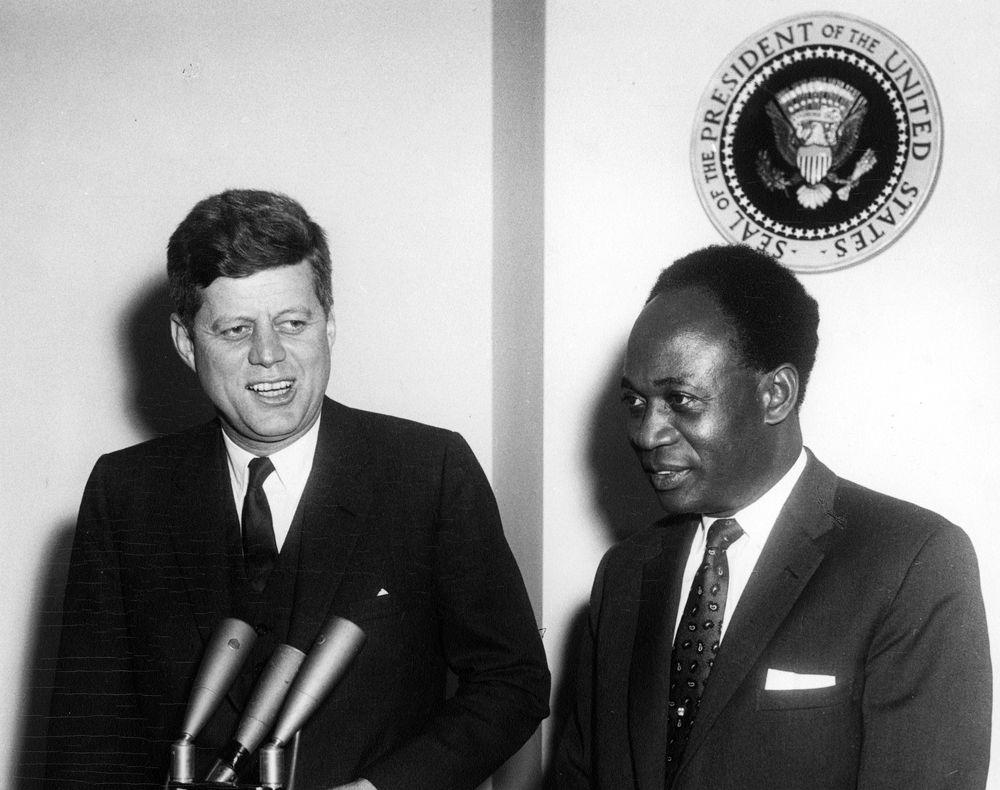African Nationalism in the 20th Century
President John F. Kennedy Meets President of Ghana, Osagyefo Dr. Kwame Nkrumah

Biography on Edward Wilmot Blyden
- Edward Wilmot Blyden was a Liberian writer and politician, consider by many to be the "Father of African Nationalism"
The period between the World Wars saw a huge increase in political activity in Africa, much of it led by younger generations. The Nationalist movements in Africa started in the early 20th century, but gained power after World War II. Several things precipitated the larger movement:
- After World War II, European powers struggled to maintain control in Africa and their colonial power weakened.
- Many Africans fought in World War II. They saw the hypocrisy that existed as the European nations were fighting for justice and democracy within Europe, but continued oppressive practices in Africa. The Double V Campaign in America had similar ideas of fighting for democracy/justice abroad while fighting for the same values at home.
- The Civil Rights Movement in the United States had an impact on Nationalist movements in Africa. Specifically, the Black Panther Party had chapters in Africa and worked in solidarity with them to end all oppression. The nationalist movements in Africa and other colonized nations around the world also influenced the Civil Rights Movement in the United States.
- African nations struggling for independence gained empowerment from other recently independent nations.
Map: Decolonization of Africa

African Resistance to European Colonization/Imperialism
- The Complexities of Resistance
- Alliances and Divisions
- Cultural and Religious Resistance
- Political Resistance
- Early Workers Labor Unions
- These were formed during the World War One and were responsible for riots and demonstrations on behalf of the workers. For example, the South African mining and Industrial strikes of the 1930s in Witswatersrand, Johannesburg.
Here is a video that shows the full timeline of colonization by European powers.
Nationalist Movements
- Political movement for the unification of Africa (Pan-Africanism) and for national self-determination started to grow in the early 20th century and grew powerful during and after WWII.
- By 1939, African nationalist groups existed in nearly every territory of the continent.
- Africa's direct involvement in World War II, the weakening of the principal colonial powers, the idea of a "Double V" type campaign around the world, and the growing Cold War political tactics from America and the Soviet Union that promoted self-government, anti-colonialism, and anti-imperialism, all helped to empower African people who for centuries had wished to escape oppression.
- America and the Soviet Union hoped to gain influence over these new self-run nations, which explains why they supported these nationalist movements. The support was all political and in hopes for a colonial type rule of an independent nation.
Examples of Nationalist Movements
African National Congress (ANC) - South Africa
Zimbabwe National Peoples Union (ZANU) - Zimbabwe
Convention Peoples Party/United Gold Coast Convention (UGCC) - Ghana
Kenyan African National Union (KANU) - Kenya
National Council of Nigeria
Tanganyika African National Union (TANU) - Tanzania
- Maji Maji Revolt
- Widespread revolt against German colonial rule in Tanganyika. It involved many communities in Tanzania including the Zaramo, Mlunga and Bena. It was given the name Maji Maji due to the belief by African warriors that by drinking magic water the bullets fired by the colonizers would turn into water.
Malagasy Uprising - Madagascar
Marcus Garvey and the African American Nationalist Movement Marcus Garvey

- Founder and president of the Universal Negro Improvement Association (UNIA)
- Leader of the African American Pan-African movement (sometimes called the Provisional President of Africa)
- Was internationally viewed (and feared) as someone who could bring down the colonial power/control in Africa and white supremacy across the world
- Sought to break down the view of Africa as the "Dark Continent" (place with savage beasts who had no culture, heritage, or future)
- Used examples of the success of Liberia and Ethiopia (the only two independent African countries at the time) in regards to social structure, trade, advanced knowledge (math, science, etc), and morality among other things
- Garveyism was the idea that Blacks from around the world should form their own republic, based in Africa, because they weren't getting justice anywhere else
- Used this idea to create a mass movement that was more successful than any other Black nationalist because he was able to give Blacks, especially African Americans, a sense that they were a people and nation "with a proud past, a heroic present, and a magnificent future" (Better Day Coming Adam Fairclough, page 112)
- Gave African Americans the idea that were Black first and American second
- Combined economic, political, and cultural freedom/nationalism
- Wanted an independent African country so the country could defend the rights of Blacks in America
- Garvey believed that if all people of African descent came together, they could liberate Africa from white colonialism
Comments (0)
You don't have permission to comment on this page.